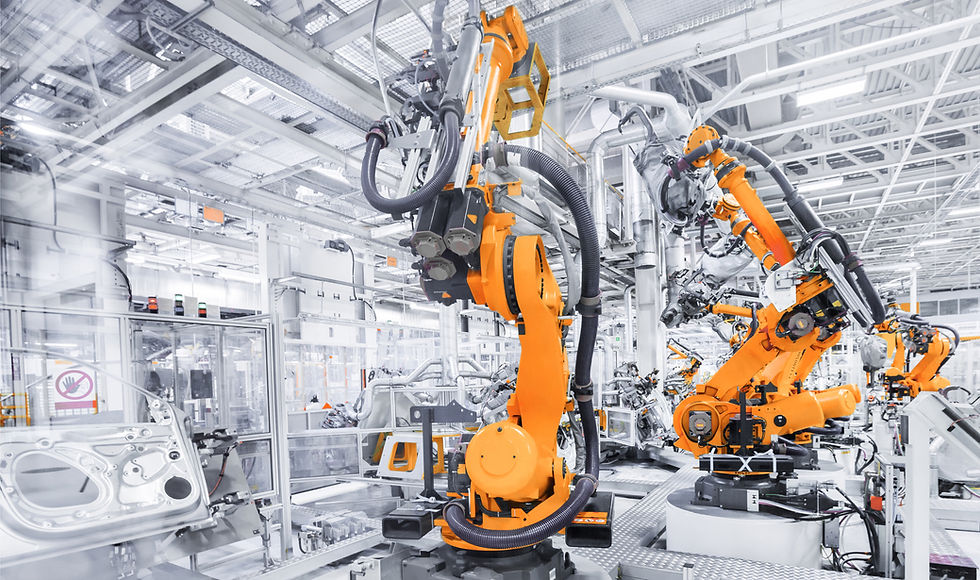Automotive
The automotive industry is one of the pillars of the modern economy and has a wide range of activities.






The automotive industry operates in a wide range of areas related to the design, production, distribution, sales and after-sales services of motor vehicles. This sector covers the production and maintenance of various motor vehicles such as cars, trucks, buses, motorcycles and commercial vehicles. Additionally, the production and distribution of automotive parts and accessories is an important part of this sector.
Fields of Activity
Design and Engineering
Vehicle Design: Concept design and development of new vehicle models.
Research and Development (R&D): Research and development of new technologies and innovative solutions.
Production and Assembly
Parts Production: Production of basic automotive parts such as engine, transmission, brake system, suspension.
Assembly Lines: Bringing the produced parts together and assembling the final vehicles.
Logistics and Distribution
Supply Chain Management: Management of all processes from raw material and parts suppliers to the delivery of final products to customers.
Distribution: Distribution of produced vehicles to dealers and end users.
Sales & Marketing
Retail Sales: Sale of vehicles to consumers through dealers.
Corporate Sales: Bulk vehicle sales for fleets and commercial users.
After sales services
Maintenance and Repair: Maintenance, repair and service of vehicles.
Spare Parts and Accessories: Sale of spare parts and accessories to increase the performance and aesthetics of vehicles.
Electric and Hybrid Vehicles
Electric Vehicle Production: Production of vehicles powered by electric motor and battery technologies.
Charging Infrastructure: Installation and management of charging stations required for electric vehicles.
Usage areas
Individual Use: Passenger cars, motorcycles and light commercial vehicles.
Commercial Use: Trucks, buses, minibuses and heavy commercial vehicles.
Public Services: Private vehicles used in public services such as police, ambulance and fire brigade.
Industrial Use: Special purpose vehicles used in industrial sectors such as construction, mining and agriculture.
Importance of the Sector
The automotive industry is one of the largest and most important sectors of the world economy. It creates jobs for millions of people and creates a broad economic impact throughout the supply chain. It is also a pioneer in the development of technological innovations and engineering solutions.
Challenges Encountered
Environmental Impacts: Negative impacts of fossil fuel vehicles on carbon emissions, air pollution and climate change.
Energy Conversion: Technological and infrastructural challenges encountered in the transition to electric and hybrid vehicles.
Regulations: Legal obligations such as emission standards and safety regulations.
Supply Chain Management: Disruptions in global supply chains and difficulties in supplying raw materials.
Competition: Increasing competition in the global market and the rapid development of innovative technologies.
Future Trends
Electric Vehicles (EV): Increasing demand for electric vehicles and investments in this field.
Autonomous Vehicles: Development of driverless vehicle technologies and the safe introduction of these vehicles.
Connected Cars: In-car internet and connection services, integration of IoT technologies.
Sustainable Production: Environmentally friendly production methods and use of recycled materials.
Shared Mobility: The proliferation of car sharing services and shared vehicle solutions.
Usage areas
Individual Use: Passenger cars, motorcycles and light commercial vehicles.
Commercial Use: Trucks, buses, minibuses and heavy commercial vehicles.
Public Services: Private vehicles used in public services such as police, ambulance and fire brigade.
Industrial Use: Special purpose vehicles used in industrial sectors such as construction, mining and agriculture.
Importance of the Sector
The automotive industry is one of the largest and most important sectors of the world economy. It creates jobs for millions of people and creates a broad economic impact throughout the supply chain. It is also a pioneer in the development of technological innovations and engineering solutions.
Challenges Encountered
Environmental Impacts: Negative impacts of fossil fuel vehicles on carbon emissions, air pollution and climate change.
Energy Conversion: Technological and infrastructural challenges encountered in the transition to electric and hybrid vehicles.
Regulations: Legal obligations such as emission standards and safety regulations.
Supply Chain Management: Disruptions in global supply chains and difficulties in supplying raw materials.
Competition: Increasing competition in the global market and the rapid development of innovative technologies.
Future Trends
Electric Vehicles (EV): Increasing demand for electric vehicles and investments in this field.
Autonomous Vehicles: Development of driverless vehicle technologies and the safe introduction of these vehicles.
Connected Cars: In-car internet and connection services, integration of IoT technologies.
Sustainable Production: Environmentally friendly production methods and use of recycled materials.
The automotive industry is a critical industry that shapes the daily life of modern societies and the global economy. Technological innovations and sustainable solutions will play an important role in the future development of the sector. Electric and autonomous vehicles, connected vehicle technologies and sustainable production methods are the key trends that will shape the future of the automotive industry. These innovations will both increase environmental sustainability and improve user experience.

